A Walk by the Dockside
by Gavin Atkin gmatkin@clara.net
The Isle of Dogs is a man-made island in the East of
London. Originally a large teardrop-shaped oxbow in what sailors call the London River,
and which you may know as the Thames, it is cut off from the mainland by a large dock.
Large areas of the island are given over to docks, most of them built in the later part of
the 19th century.
The local landmarks have names derived from far-off
places, such as Canary Wharf, West India Quay and Dollar Bay. One, Blood Alley, is so
named because the stevedores were so badly lacerated by the sugar cane they carried to a
warehouse nearby that the paving was stained red.
The docks declined with the coming of the down-river
container ports in the 1950s and 60s, but came back to life when a new business ghetto,
Docklands, was established here in the 1980s - and, as you might have guessed, this is
where I spend my working hours.
Most of the water remains, and the old docks are now used by
ships carrying cargoes of building materials into the Island (and taking large amounts of
the Island away as spoil, I should add), by rowers and dinghy sailors from the sailing
centre and the small sailing club, and by the usual river police and harbour authorities.
This is also home to a number of historic vessels and a Sea
Scout centre, and there is still space for visiting warships, sail training ships and the
odd yachting rally. In many ways, it's not a bad place to take a lunchtime walk from the
office if you're a boat nut!
Here's a link to local map:
https://www.streetmap.co.uk/streetmap.dll?grid2map?X=537500&Y=179500&zoom=3
The following pictures represent a tour I take several times a
week, usually along with my agreeable colleague Wilf.
Turning right out of the office smoker's exit, the first boats
we see are dragon boats. I don't know if the rest of the world has them, but over here
they're mainly used as a very wet way of raising sponsorship money for charity. Large
teams of young people sit in these things and paddle to the rythmn of a drum; nominally
they are racing but, in fact, they're really trying to stay out of the water as long as
possible - when enough of them get out of rythmn, they all fall in. I gather it helps if
you're a little drunk.
Kids! We didn't do anything like that when I was young...
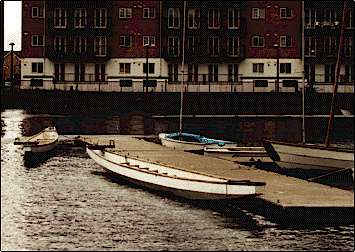
Dragon boats
Security is a big issue round here; this has been a very poor
area for longer than anyone can remember, and crime is rife. However behind the chicken
wire you can just about see a canoe for the disabled, fitted with a small stabilising ama.
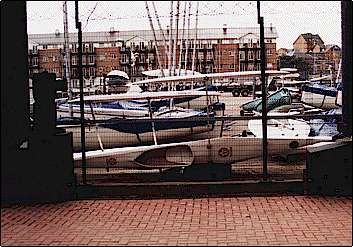
Canoes with small
amas
2.4m yachts are a fascinating oddity. Essentially, they are a
one-design formula racer that looks like a tiny metre-class yacht. The single-handed helm
has to lie inside the hull like the sausage in a hot dog. As always with any strange kind
of sailing vessel, I want to have a go!
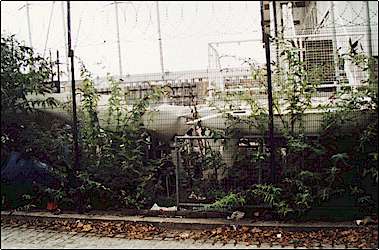
2.4m behind the wire
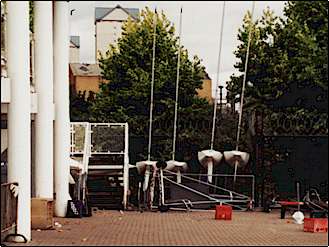
2.4m from inside the
compound
These are Bosun class dinghies, which were developed as a
training sailing dinghy for the Royal Navy but are now used quite widely by civilian
training schools. They're heavy and solid, and made to stand a huge level of abuse. A nice
feature is a pair of very substantial hand rails along the bilges for when you fall in.
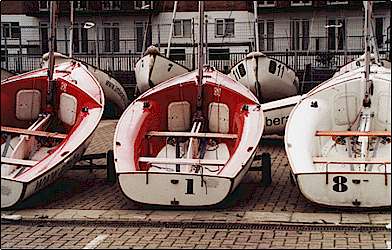
Bosun class dinghies
I don't know where these beautiful skiffs come from - they could
derive from any of a dozen traditional types from around the UK. They get a lot of use,
but not on this day.
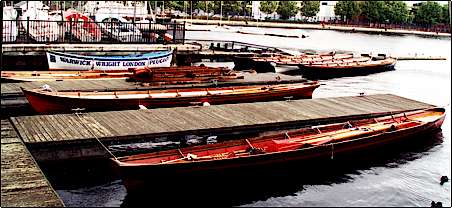
Long rowing skiffs
This is what I call a waste. Each of the houses around this
disused graving dock has its own jetty, and hardly anyone has a boat. Why? I don't know,
but don'g believe any of that guff you hear about the British being a nation with the sea
in their blood.
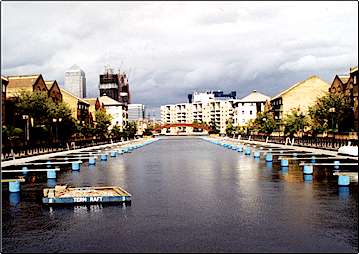
Empty jetties
Here are a couple of barges nestling among the offices. I'm told
pornographic magazine are produced in the white building on the right, and judging by some
of the people who use the station nearby, I can believe it. The nearest craft is a Dutch
sailing barge sadly now in declining condition; behind it is a traditional Thames barge,
Scone, which is currently up for sale.
For more about Thames Barges:
https://www.thamesbarge.org.uk/barges/active.html
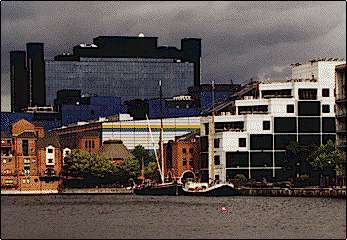
Barge pic 1
If you check the link, you'll see that the mizzen is attached to
the rudder - this puzzles many people, but it's there to make the boat lighter to
steer.Here's a different view of Scone.
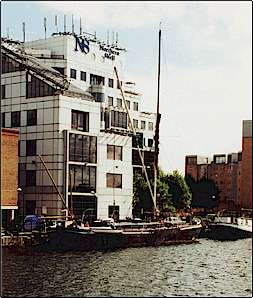
Barge pic 2
And here are some details of another barge, now used as a pub.
Two 'wangs' (not vangs) help to keep the sprit under control, while the mainsheet and
staysail sheet horses allowed these burdensome, flat-bottomed 90-foot boats to be crewed
by just two people. I can't think of many other British traditional boats that have used
leeboards, and those that have are mainly barges.
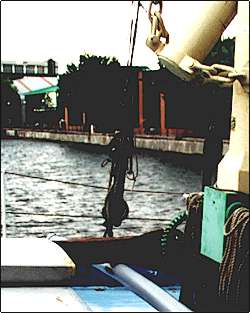
Barge pic 3
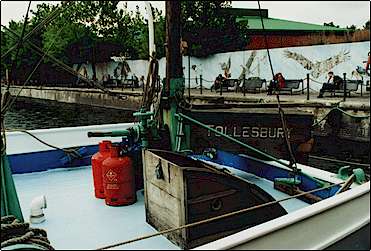
Barge pic 4
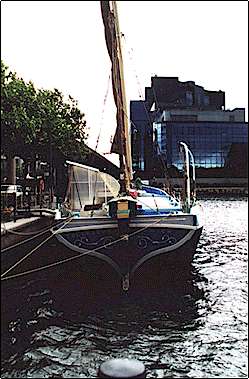
Barge pic 5
The Scouts here have an impressive collection of traditional and
modern whaleboats, though the white-sterned boat you can see here actually belongs to the
Cutty Sark.
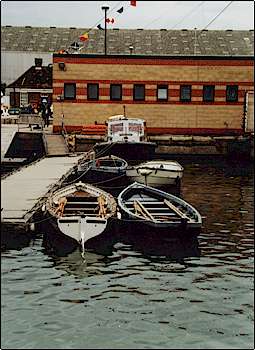
Scout's whaleboats
and one of the Cutty Sark's tender
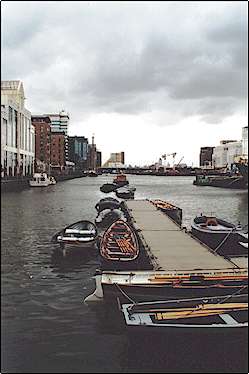
More Scout's
whaleboats
Here is the figurehead of the well known sail training ship, the
Sir Winston Churchill, tied up in Dollar Bay. I hear it's also for sale, if anyone wants a
schooner this size.
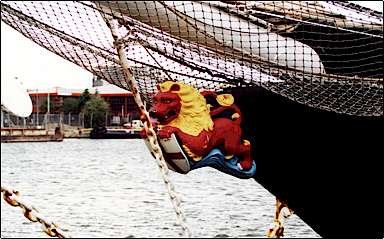
Sir Winston
Churchill 1
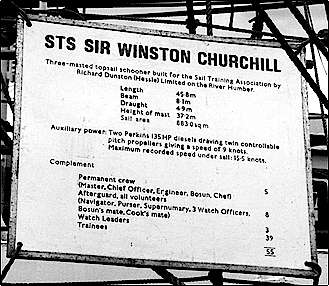
Sir Winston
Churchill 2
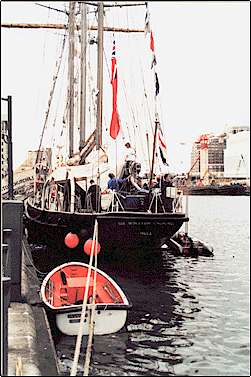
Sir Winston
Churchill 3
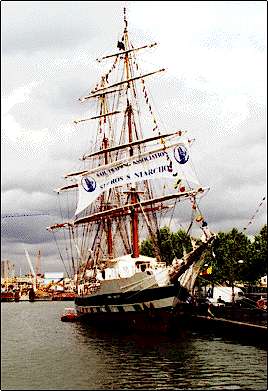
Stavros Niarchos
This is another sail trainer, the very new Stavros Niarchos.
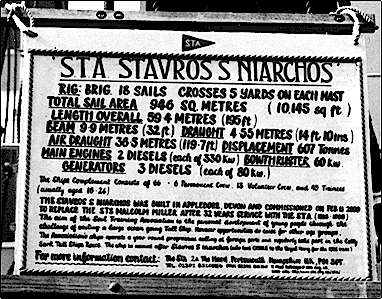
Stavros Niarchos 1
Many strange and exotic craft tie up in Dollar Bay, and their
crews usually take good advantage of two watering holes, The Gun, where Admiral Lord
Nelson at one time trysted with his mistress Lady Hamilton, and this one, the Queen of the
Island, which was once a famous bordello. This painting on the wall seems to suggest it
might still be so...
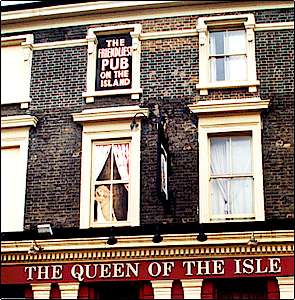
Click here for "A Trip to Greenwich"